English Words in Action, Group B
(a variety of English words which have developed through history and are currently used in our modern age)
Simply click on this banner (or the following link) and you will be on your way to stimulate your brain for greater word comprehension with quizzes based on some of the words in this unit.
The teacher said he would not brook such outrageous conduct by students in the classroom.
2. Etymology: from Old English brucan, "to use, to enjoy".The word brook is nearly always used now with a negative construction; such as, "no brooking" or "not brooked".

Go to this Word A Day Revisited Index
so you can see more of Mickey Bach's cartoons.
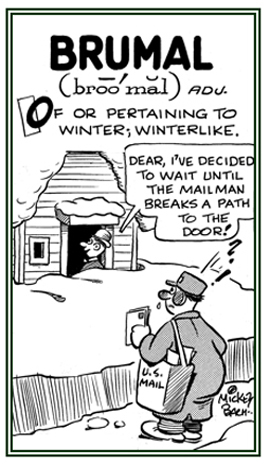
Go to this Word A Day Revisited Index
so you can see more of Mickey Bach's cartoons.
Marian bore the brunt of her father's anger.
2. Etymology: from Old Norse bruna, "to advance quickly"; such as, "a fire."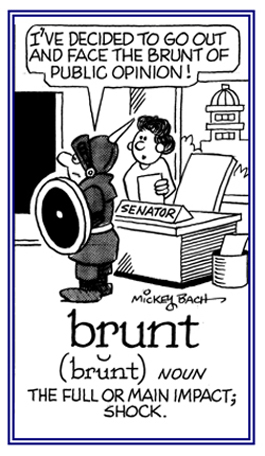
Go to this Word A Day Revisited Index
so you can see more of Mickey Bach's cartoons.
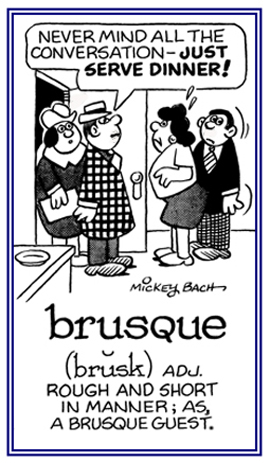
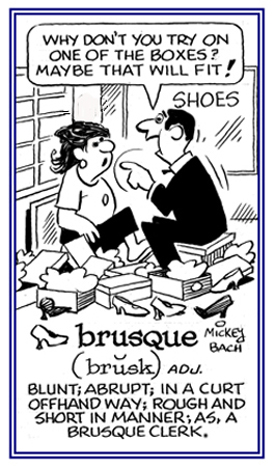
Go to this Word A Day Revisited Index
so you can see more of Mickey Bach's cartoons.
When a bottle of a soft drink is shaken, a lot of air bubbles can be seen going up to the top of the bottle.
2. A gurgling sound made by a boiling or effervescent liquid: While drinking Paul could hear a sound produced by bubbles forming and bursting.3. A dome, usually made of transparent glass or plastic: The plastic bubble covered the cheese tray so the cheese wouldn't get dry.
4. The circle around the words said by people in a cartoon: The bubbles seen in cartoons contain the words that are spoken by the characters in the cartoon image or the cartoon strip.
5. A false feeling of confidence or security: Henry predicted that the rocketing housing market would be a bubble that would surely burst.
6. A risky or an unreliable business enterprise or speculative plan; especially, one that is fraudulent or unsuccessful: A lot of people suffered economically when the dot-com bubble burst.
There have been several times when people have invested money in something which has caused its value to rise to a level which is much higher than its real value until that bubble suddenly drops or bursts.
Is the rush for shares in the social-networking site for business professionals an uncomfortable echo of bubbles past? When an investor believes that other people would pay even more than the current high price for a stock, that's how bubbles develop.
2. To flow with the quiet sounds of water moving over rocks: The brook was bubbling over the rocks and creating a wonderful sound.
3. To be very excited and happy: During the party, on the last day of school, the children were bubbling with excitement.
4. When emotions or feelings exist in a person without being shown to others: The winner of the prize seemed calm; however, his mother could see that her son was bubbling over with excitement about getting the trophy.
2. Very cheerful, happy, and lively: Little Shamika was cute, bubbly, and smart, too.
Meagan and Andy were working on details as to what the monthly budget for their family of four will be as determined by Andy's income.
Sanford's project was completed on schedule and under budget.
2. An annual or other estimate of national revenue and expenditures that are determined by a government: The official statement of a budget from a government is about how much it plans to spend during a certain period of time and how it will pay for such expenses.3. Etymology: French merchants of the Middle Ages carried their money around in a bougette, or "little bag" which came from Latin bulga, "a leather bag" or a "knapsack".
The term became bouge when it was adapted into twelfth-century French. Later, the form bougette was being used with reference to "a small bag" in English, then it became bowgette in the fifteenth century and by about 1611, it was being spelled as budget.
Near the end of the sixteenth century, the term budget referred to "the contents of a pouch" or "a wallet; a package, a bundle, or a collection".
The financial sense of budget was recognized in about 1733, when it was used for "a statement of the financial position of a government for the following year based on what the estimates of expenditures and revenues were expected to be".
Maynard budgets a maximum of fifty dollars each month for the entertainment of his family.
2. To make and to follow a plan for spending money: Greta and Frank are budgeting their money for a trip to France.3. Planning how to use something; such as, time: Hilda feels that she needs to budget her time better for her hobby as well as for the necessities of life.
Ingrid is a buff who knows a lot about English vocabulary words because she has a great deal of experience with classical Latin and Greek.
2. Etymology: from the early 20th century from suff, originally applied to enthusiastic fire-fighters, because of the buff-colored uniforms (a dull-yellow leather from buffalo hides) formerly worn by New York volunteer firemen.By 1931, the meaning was extended to refer to any enthusiast or devotee.
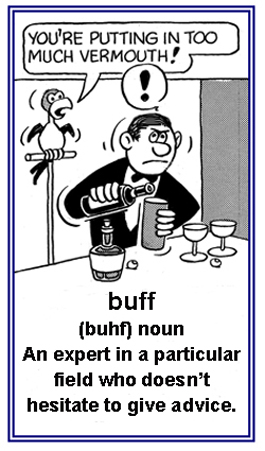
Go to this Word A Day Revisited Index
so you can see more of Mickey Bach's cartoons.
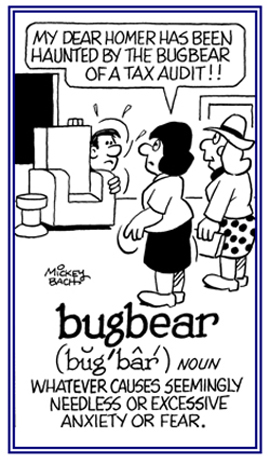
Go to this Word A Day Revisited Index
so you can see more of Mickey Bach's cartoons.
Links to all of the groups of English words in action, Groups A to Z.
You may see the bibliographic list of sources of information for these words in action.


